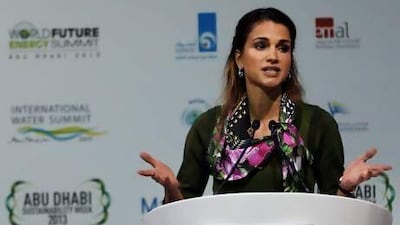ABU DHABI // One in five people on the planet, or a total of 1.4 billion worldwide, lack access to grid electricity, and a billion more have unreliable access.
Those sobering figures were provided by Queen Rania of Jordan as she addressed the opening of Abu Dhabi Sustainability Week.
"Energy is humanity's lifeblood," said the high-profile sustainable development and education campaigner.
"Where it flows, prosperity burgeons. Where it stalls, the impoverished and disadvantaged languish burdened by multiple challenges."
Queen Rania praised the work done by Abu Dhabi in the field of sustainable energy, especially during such a challenging time for the region.
"I cannot think of a better place for us to gather," she told the crowded auditorium at the Abu Dhabi National Exhibition Centre yesterday.
"Abu Dhabi's bold vision for sustainable energy is transforming this nation and inspiring our region at a time when the Arab world is at a critical juncture.
"No one can predict the future but this much is true: energy requirements will play a vital role in determining it."
She went on to remind the audience of the plight of vulnerable populations in the Middle East. In Gaza, Queen Rania said, children used outdoor street lights to read and prepare their schoolwork.
"Here's the thing - maths can be hard, grammar can be hard, exams can be hard," she said. "Light to study by in the evening, in the safety of your home? That should be easy.
"Because if it's not easy, children will drop out of school. And as they do so the promise of better health, good jobs and stronger economies goes with them."
Yemen and Sudan, where "midwives pray that mothers will give birth in daylight" also face significant energy challenges, leaving many vulnerable.
Queen Rania also spoke of the Al Dakhil Clinic in Baghdad, Iraq, where "blackouts are so frequent they had to destroy precious medicines because they couldn't be kept at the right temperatures".
"Children do not deserve these injustices," she said, adding that "there are no technical barriers" in solving problems related to energy access.
"With capital investment and political will, we could light up schools for children … power health clinics for mothers and their babies … and pump clean water for families," Queen Rania said.
Renewable energy is already playing a role in reaching the disadvantaged and alleviating poverty, she said, giving as an example a programme in Jordan that trains Bedouin women to be solar engineers, replacing kerosene lamps with solar-powered lights.
Such examples need to be scaled up, she said.
"Ladies and gentlemen, there is an industry waiting to be tapped and the Arab world is perfectly positioned not only to tap it, but to lead it," said Queen Rania.
"In so doing, we would be addressing one of the key fundamentals to a more corrective course for the region, using the potent energy of our people to chart the way forward."

